|
|
|
Sort Order |
|
|
|
Items / Page
|
|
|
|
|
|
|
| Srl | Item |
| 1 |
ID:
101766
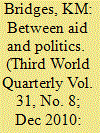

|
|
|
|
|
| Publication |
2010.
|
| Summary/Abstract |
Humanitarian advocacy is emblematic of the relief community's desire to move beyond simply treating the symptoms of suffering, and towards tackling the causes. As such, advocacy is at the front line of debates over where the boundaries between aid and politics should now be drawn and the point where dissension on the subject is most evident. In this paper the challenge that advocacy poses for traditional humanitarian operations in Darfur and the effect of such political engagement on humanitarian identity more generally is assessed. Disagreement among humanitarian organisations is exacerbated by the continued tendency of aid agencies to privilege reaction over reflection. Floundering between unachievable traditional humanitarian principles and the failure of human rights to provide an adequate alternative, humanitarianism is swiftly losing both its identity and its legitimacy. To emerge from the fog of confusion humanitarianism must now take on the professionalism of military science and endeavour to better know both itself and its enemies.
|
|
|
|
|
|
|
|
|
|
|
|
|
|
|
|
| 2 |
ID:
101771
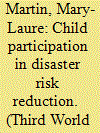

|
|
|
|
|
| Publication |
2010.
|
| Summary/Abstract |
Children are particularly vulnerable to the effects of natural disasters. This article aims to gain a deeper understanding of the specific effects of natural disasters on children and how they could better be involved in the disaster risk reduction (DRR) process. The article begins with a review of the literature published on the Child-led Disaster Risk Reduction (CLDRR) approach and describes the key issues. Then it identifies the effects of floods on children in Bangladesh and analyses the traditional coping mechanisms developed by communities, highlighting where they could be improved. Finally, it analyses how DRR stakeholders involve children in the DRR process and identifies the opportunities and gaps for the mainstreaming of a CLDRR approach in Bangladesh. This should contribute to a better understanding of how key DRR stakeholders can protect children during natural disasters. Encouraging the building of long-term, child-sensitive DRR strategies is an essential part of this process.
|
|
|
|
|
|
|
|
|
|
|
|
|
|
|
|
| 3 |
ID:
101767
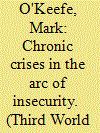

|
|
|
|
|
| Publication |
2010.
|
| Summary/Abstract |
This aim of this paper is two-fold. The first aim is to expand on a claim that an 'Arc of Insecurity' stretches across sub-Saharan Africa. The second is to explore the difficulties of chronic crises within this arc. The paper will contrast countries that have experienced the following three indicators used to highlight the acute phase of a chronic crisis: conflict-related mortality, displacement and climatic disasters. The second part of the paper discusses 'chronic crisis' situations by utilising a case study of Karamoja, northeast Uganda. Karamoja is characterised by the worst humanitarian and development indicators in Uganda and its problems are indicative of other chronic situations. While countries, or more specifically, situations within countries, can be insecure, every situation remains unique. Responses to chronic situations need to be based on a solid understanding of the political-economic causation of crisis.
|
|
|
|
|
|
|
|
|
|
|
|
|
|
|
|
| 4 |
ID:
101773
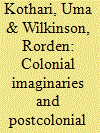

|
|
|
|
|
| Publication |
2010.
|
| Summary/Abstract |
This article draws on Edward Said's notion of 'imaginary geographies' to explore how representations of small island states enabled particular colonial interventions to take place in the Indian Ocean region and to show how these representations are currently being reworked to support development strategies. It examines how particular colonial imaginaries justified and legitimised spatially and temporally extended transactions before focusing on two examples of forced population movements: British colonial policy of forcibly exiling anti-colonial nationalists and political 'undesirables' from other parts of the empire to Seychelles; and the use of islands in the region as strategic military bases, requiring the compulsory relocation of populations. While a colonising legacy pervades contemporary representations of these societies, such depictions are not immutable but can be, and are being, appropriated and reworked through various forms of situated agency. Thus an 'island imaginary' has become an important cultural and economic resource for small island states, most notably in the development of a tourist industry. The key challenge for vulnerable peripheral states is to create new forms of representations that contest and replace tenacious colonialist depictions to provide greater opportunities for sustained development.
|
|
|
|
|
|
|
|
|
|
|
|
|
|
|
|
| 5 |
ID:
101772
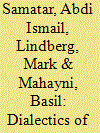

|
|
|
|
|
| Publication |
2010.
|
| Summary/Abstract |
Somali piracy has been poorly understood and consequently the international strategy designed to curtail it has not worked. Because of this mismatch some of the pirates have extended their exploits deep into the Indian Ocean. This article provides an analysis which shows that several pirate types driven by different logics have operated along the Somali coast and all but one of these pirates emerged as a result of the Somali state's disintegration. In contrast, pirates in other Third World regions operate under established states. Therefore, we argue that piracy is not only a matter of robbery on the high seas, but that political economy and conflict over resources have been fundamental to the rise of piracy in the region. The article offers a more refined assessment of the piracy in the region, as well as a critical appraisal of the moral economy of Somali pirates which yields an alternative method of understanding and curbing the problem.
|
|
|
|
|
|
|
|
|
|
|
|
|
|
|
|
| 6 |
ID:
101768


|
|
|
|
|
| Publication |
2010.
|
| Summary/Abstract |
This article investigates the conflict that had been developing since the 1950s in Darfur and which in 2003 and 2004 burst into intense warfare. A 'complex-structuring of violence' standpoint explains the warfare. The argument is organised in two parts. The first section formulates the position by introducing Darfur, next evaluating the prevailing barbarisation perspective's attempts to explicate Darfur warring and, finally, formally presenting the complex structuring standpoint. The second section offers evidence bearing upon this standpoint. This involves information showing that four interrelated structural realms form a causal complex producing the violence. The article ends with discussion of the US government's role in Darfurian disasters of war.
|
|
|
|
|
|
|
|
|
|
|
|
|
|
|
|
| 7 |
ID:
101769
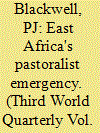

|
|
|
|
|
| Publication |
2010.
|
| Summary/Abstract |
The global warming trend of climate change is having severe adverse effects on the livelihoods of the Turkana pastoralists of northwestern Kenya. Care has to be taken in making assertions about the impact of climate change. The biggest effects may come not from lower average rainfall but from a widening of the standard deviation as weather extremes become more frequent. In a region already prone to drought, disease and conflict, climate change, access to modern weapons and new viral livestock diseases are now overwhelming pastoralists' coping capacity and deepening the region's roughly 30-year dependency on famine relief. This article examines the livelihood strategies of the Turkana and several poverty reduction programmes currently established, while addressing the reality that traditional pastoralism may no longer be a viable livelihood option, given the effects of climate change, disease and the ensuing conflict over diminishing resources. The findings conclude that the future for traditional Turkana pastoralists is dismal because they continue to depend on an environment that may no longer support them. Humanitarians are recommended to shift their focus to advocate and invest in alternative livelihood strategies that generate economic independence and help the Turkana adapt to their changing environment.
|
|
|
|
|
|
|
|
|
|
|
|
|
|
|
|
| 8 |
ID:
101764
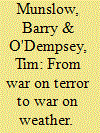

|
|
|
|
|
| Publication |
2010.
|
| Summary/Abstract |
This special issue of Third World Quarterly makes a case for redirecting attention and resources away from the 'war on terror' and focussing as a matter of urgency on the causes and consequences of global climate change. Global climate change must be recognised as an issue of national and international security. Increased competition for scarce resources and migration are key factors in the propagation of many of today's chronic complex humanitarian emergencies. The relentless growth of megacities in natural disaster hotspots places unprecedented numbers of vulnerable people at risk of disease and death. The Earth's fragile ecosystem has reached a critical tipping point. Today's most urgent need is for a collective endeavour on the part of the international community to redirect resources, enterprise and creativity away from the war on terror and to earnestly redeploy these in seeking solutions to the far greater and increasingly imminent threats that confront us as a consequence of global climate change.
|
|
|
|
|
|
|
|
|
|
|
|
|
|
|
|
| 9 |
ID:
101770
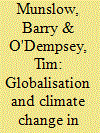

|
|
|
|
|
| Publication |
2010.
|
| Summary/Abstract |
Asia's economic development successes will create new policy areas to address, as the advances made through globalisation create greater climate change challenges, particularly the impact on urban health. Poverty eradication and higher standards of living both increase demand on resources. Globalisation increases inequalities and those who are currently the losers will carry the greatest burden of the costs in the form of the negative effects of climate change and the humanitarian crises that will ensue. Of four major climate change challenges affecting the environment and health, two-urban air pollution and waste management-can be mitigated by policy change and technological innovation if sufficient resources are allocated. Because of the urban bias in the development process, these challenges will probably register on policy makers' agenda. The second two major challenges-floods and drought-are less amenable to policy and technological solutions: many humanitarian emergency challenges lie ahead. This article describes the widely varying impact of both globalisation and climate change across Asia. The greatest losers are those who flee one marginal location, the arid inland areas, only to settle in another marginal location in the flood prone coastal slums. Effective preparation is required, and an effective response when subsequent humanitarian crises occur.
|
|
|
|
|
|
|
|
|
|
|
|
|
|
|
|
| 10 |
ID:
101765
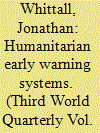

|
|
|
|
|
| Publication |
2010.
|
| Summary/Abstract |
The field of humanitarian early warning has emerged as a way to alert governments about countries facing imminent humanitarian crises, based on indicators of potential conflict, food shortages and other related issues. Early warning as a technical field has often failed because intervention in another state is based on national self-interests and the constraints of sovereignty. Governments continue to be unresponsive to areas outside of these considerations. Because this reality is overlooked, all the literature reviewed focuses on the technical fixes required to address the well known failures in early warning. As such, humanitarian early warning is frequently inconsequential at best, and at worst it has become instrumentalised by states to justify their interventions in countries based on their national self-interest, which is increasingly linked to national security in the era of the so-called 'global war on terror'.
|
|
|
|
|
|
|
|
|
|
|
|
|
|
|
|
| 11 |
ID:
101774


|
|
|
|
|
| Publication |
2010.
|
| Summary/Abstract |
The Chilean governance model of resource extraction challenges the view that post-neoliberalism is an opposing development model rejecting the Washington Consensus, which is constitutive of neoliberal governance. Instead, post-neoliberalism is continuity with change, where marketised governance in mining is maintained by the Chilean state yet certain policy agendas are introduced in response to the failures of staunchly private sector-driven development. Neostructuralism follows the logic of productivism, which emphasise the depoliticisation of copper management and the political exclusion of voices critical of the model. However, it breaks away from the typical mode of neoliberalism because there exist political spaces for contestation of copper policy, particularly through the re-regulation of labour practices and the passage of royalty law to address Chile's vulnerabilities to external factors affecting copper production. The article contributes to the understanding of continuities and changes in post-neoliberal Latin America by unpacking the elements of natural resource governance in one of the most widely cited successful cases of a mining-based development model in the developing world.
|
|
|
|
|
|
|
|
|
|
|
|
|
|
|
|
|
|
|
|
|